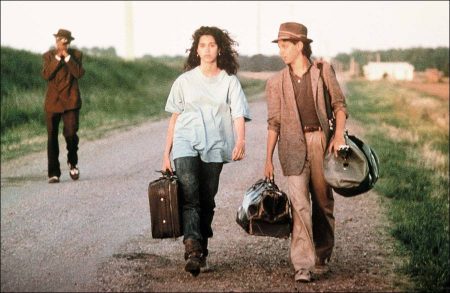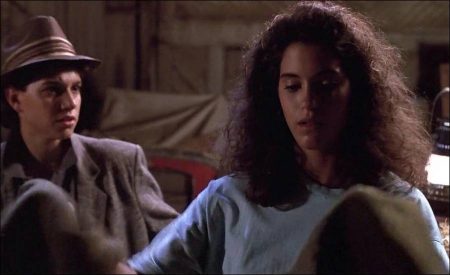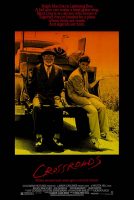Taglines: Where second best never gets a second chance.
Eugene Martone, the “Lightening Boy” (Ralph Macchio), is a lover of blues. He studies guitar in Julliard, but he indeed is looking for the thirtieth unknown song of Roberto Johnson. One day, he meets Willie Brown, the “Blind Dog” in an old folk’s home and is convinced that he possess the lost song. Eugene helps Willie to escape the asylum and goes with him to Mississippi.
They can just afford a bus ticket from New York to half way to Mississippi, so the rest of their journey is hitchhiking. In the way, they meet Frances, a girl who left home and wishes to be a dancer in Los Angeles. They three together pass through many strange adventures and situations, and the climax is the guitar duel between Eugene and Jack Butler.
Crossroads is a 1986 American coming-of-age musical drama film inspired by the legend of blues musician Robert Johnson. Starring Ralph Macchio, Joe Seneca and Jami Gertz, the film was written by John Fusco and directed by Walter Hill and features an original score featuring Ry Cooder and guitar virtuoso Steve Vai on the soundtrack’s guitar, and harmonica by Sonny Terry. Steve Vai also appears in the film as the devil’s guitar player in the climactic guitar duel.
Fusco was a traveling blues musician prior to attending New York University Tisch School of the Arts, where he wrote Crossroads as an assignment in a master class led by the screenwriting giants Waldo Salt and Ring Lardner Jr. The student screenplay won first place in the national FOCUS Awards (Films of College and University Students) and was sold to Columbia Pictures while Fusco was still a student.
About the Production
The script was an original by John Fusco, who had long been interested in blues music. He worked as a blues singer and musician but had been warned by a doctor to rest his voice. In 1981 his girlfriend, who was working at a rest home, told him that an old black man with a harmonica had been admitted. Fusco went to visit him and on the way dreamt up a story about what would happen if the player was a legendary blues player. This gave him the idea for the story. He expanded on the myth of Robert Johnson selling his soul to the Devil at the crossroads. Coincidentally, Johnson was inducted to the inaugural class of the Rock and Roll Hall of Fame in January 1986, while the film was in production.
Fusco wrote the script as his Master’s Thesis at New York University. It was only his second screenplay. Producer Mark Farliner acted as Fusco’s independent adviser on it and later helped get it made.[3] Fusco was paid $250,000.
Jami Gertz was cast as the female lead. “She had the warmth I was looking for”, Hill said, “and she was feisty, but I wondered, is she strong enough? She has to put Macchio through the experience of falling in love, and then she has to leave him, to strengthen his character for the movie’s final showdown. I decided to go with her, and I was amazed by how strong she seemed on the screen.” Guitar specialist Arlen Roth was hired as Macchio’s musical coach.
Hill was aware of some surface similarities to The Karate Kid: “You boil it down, and it sounds like a young kid and a wise old guy and their showdown with evil”, said Hill. “But if you really look at ‘Crossroads,’ it’s a completely different movie…I knew my most difficult task would be creating real, believable scenes between Macchio and Seneca. They had to be real characters; with an ongoing reality level, to work at all. You have to set the stage, or when your movie shifts gears to fantasy, you lose your audience.”
Crossroads (1986)
Directed by: Walter Hill
Starring: Ralph Macchio, Joe Seneca, Jami Gertz, Joe Morton, Robert Judd, Steve Vai, Dennis Lipscomb, Harry Carey Jr, John Hancock, Allan Arbus, Gretchen Palmer, Al Fann, Diane Robin
Screenplay by: John Fusco
Production Design by: Jack T. Collis
Cinematography by: John Bailey
Film Editing by: Freeman A. Davies
Set Decoration by: Marvin March
Art Direction by: Albert Heschong
Music by: Ry Cooder
MPAA Rating: None.
Distributed by: Columbia Pictures
Release Date: March 14, 1986
Views: 346


